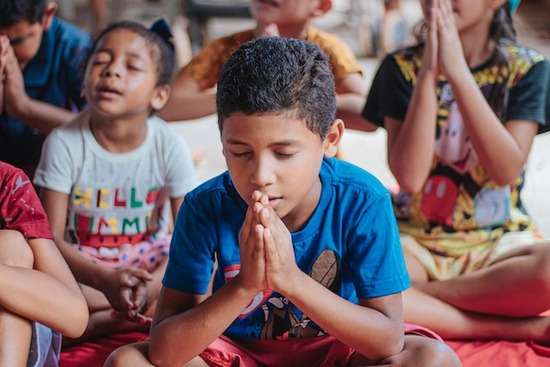What Is Children’s Sabbath School in the Adventist Church?
Children’s Sabbath School is a Bible program offered every Sabbath at Adventist churches for children from birth to age 18. These classes give children the chance to learn Bible stories, make new friends, and participate in fun activities.
And most importantly, they offer age-appropriate curriculums to teach children what it means to follow Jesus Christ.
Follow along as we show you:
What are children’s Sabbath School classes like?
Similar to the adult Sabbath School, children’s Sabbath School classes take place in many Adventist churches every Sabbath. The classes typically start at 9:30 a.m. before the church worship service, and they are designed with lessons and activities based on the age of the students.
However, small churches may combine age groups together if they don’t have enough students or teachers. For example, the cradle roll class (infants to two-year-olds) might be combined with kindergarten (three to four-year-olds), and the earliteen class might be combined with the teen class to create a bigger group.
In general, younger students learn Bible stories through interactive activities like songs and crafts. Older students, on the other hand, learn about the Bible and its practical applications through discussion.
Let’s get a tour of each class, starting with cradle roll.
Beginner/cradle roll
As you enter this class, you’ll see young babies and toddlers up to two years old, listening to their teachers tell Bible stories.
During the program, teachers will lead the kids in Bible songs and activities that relate to and illustrate their Bible lesson. They might interact with puppets, earn stickers for repeating memory verses, or enjoy a Bible-themed snack (like animal crackers for Noah’s ark).
Through all the fun and singing, the children are left with one overarching message—that they have a Savior and God who loves them!
Kindergarten
Kindergarten is for children ages three to four. In this class, they sing with their teachers and participate in even more Bible activities. You may see teachers illustrating the weekly Bible story with felt characters and scenery.
Through the lessons, the children learn how much Jesus loves them and what it means to love others too.
Primary
If you head into the primary Sabbath School class, you’ll see elementary-aged children (five to nine years old). The students will sing and enjoy interactive activities about Jesus, as in the other classes for younger children.
By this age, they’ll also do more complex activities like making crafts to illustrate the day’s lesson. For example, they might use playdough and popsicle sticks to recreate Bible scenes from the stories of Noah’s ark or David and Goliath.
Junior
By now, we’re getting to the classrooms with the older kids. Here, you’ll see ten- to twelve-year-olds discussing their lesson with their teachers.
Though they don’t have as many hands-on activities as earlier classes, the juniors still enjoy learning from object lessons, puzzles, and other brain teasers as they grow in their relationship with Jesus.
Earliteen
In this classroom, you’ll meet a group of young teenagers, ages 13 to 14. You’ll listen in as they look up Bible passages, review the lesson from the week, and learn object lessons from history, science, and nonfiction stories.
The programs for this age group are geared to help the students make good decisions and live Christ-centered lives.
Teen/youth
At last, you’ll enter the final classroom on our tour—the class for high school students, ages 15 to 18. Here, the teacher leads the students in a deeper discussion of the Bible and directs them to verses that apply to the particular lesson.
Don’t be surprised if you hear the students ask a lot of questions.
It’s in this class that they are really encouraged to dig deep and ask tough questions about the Bible and how it relates to their lives.
What programs are used to teach Sabbath School?

Photo by Mikhail Nilov
Most Sabbath Schools use the Children’s Sabbath School lessons produced by the administrative body of the Seventh-day Adventist Church—the General Conference.
However, these lessons aren’t the only options for teachers. Some teachers choose lessons that have been produced by independent ministries or individual churches. Others may simply customize the General Conference’s lessons to fit their students’ needs.
The overall goal is to use lessons that are relevant, Bible-based, and engaging for the students.
Typically, local churches purchase the lessons and provide them to the students for free. The students may take the lessons home so that they can prepare for their lesson throughout the week by:
- Memorizing the memory verse
- Reading the lesson
- Doing the lesson’s daily activities
Interested in accessing the Sabbath School programs for yourself?
You can:
- Download the Sabbath School & PM app from the Apple App Store or Google Play.
or
- Visit the children’s Sabbath School’s official website to download the lessons for free.
You can find the lessons in a variety of languages: English, Spanish, French, Chinese, and many more.
Who teaches children’s Sabbath School?
Sabbath School teachers are chosen by the local church’s Sabbath School council, typically based on their ability and enthusiasm to teach children about the Bible.1
But before they can teach, the church requires them to2:
- Complete child-safety verifications
- Get a background check
We also encourage our teachers to go through teaching training courses.3 This way, they can learn methods to make Sabbath School more engaging.
What makes children’s Sabbath School so important?

Photo by Carlos Magno on Unsplash
Children’s Sabbath School helps children learn about Jesus and the Bible. It makes attending church a positive experience for them and gives them something they can understand and relate to.
Back before children’s Sabbath Schools existed, Adventist church leader James White recognized the need for some kind of biblical instruction for children.4 That spurred him to publish a paper called the Youth’s Instructor.5 This paper featured some lessons Bible class teachers could use to instruct children.
But these articles weren’t specifically for Sabbath School, and they didn’t always address children’s learning needs.6
The first lessons designed for children came about in 1863 when a woman named Adelia Pataten wrote children’s lessons in the Youth’s Instructor. From there, Goodloe Harper Bell, an Adventist school teacher, created more Bible lessons in 1869, dividing them into age categories—one for children and one for youth.7
Although the lessons had been available for years, official classes weren’t started until 1878, when the General Conference created the General Sabbath School Association to oversee and organize Sabbath Schools across North America.8
And eventually, as the Adventist church’s reach grew bigger, Sabbath Schools spread to churches across the world.9
Though this children’s ministries project began as an attempt to teach children about the Bible, it has become so much more. Children’s Sabbath School’s mission is to give children the opportunity to10:
- Study the Bible
- Enjoy Christian fellowship
- Take part in community outreach
- Support world missions and evangelism through Sabbath School offerings
Sabbath School programs have helped generations of children learn about the Bible, serve their community, and grow in their relationship with Jesus while they make friends and enjoy fun activities.
Are you interested in bringing your kids or grandkids to Sabbath School?
At your local Adventist Church, ask the greeters at the church doors where the children’s classes are. They’ll gladly help you find the right classroom.
Never been to an Adventist Church before? Get a sneak peek of what it’s like by reading
Children’s Sabbath School Resources
- Seventh-day Adventist Church Manual, 19th Edition, p. 99. [↵]
- Ibid. [↵]
- Ibid. [↵]
- Kuntaraf, Jonathan Oey, “Sabbath School Personal Ministries Department, General Conference of Seventh-day Adventists,” Encyclopedia of Seventh-day Adventists. [↵]
- The Youth’s Instructor. [↵]
- Kuntaraf. [↵]
- Ibid. [↵]
- Ibid. [↵]
- Ibid. [↵]
- Ibid. [↵]
Questions about Adventists? Ask here!
Find answers to your questions about Seventh-day Adventists
More Answers
Why Many Seventh-day Adventists Choose a Vegetarian Diet
Why Many Seventh-day Adventists Choose a Vegetarian Diet?You may have an Adventist friend who is vegetarian, or maybe you’re attending a Seventh-day Adventist Church for the first time and notice the potluck doesn’t have any meat. This isn’t unusual in Adventism. In...
The Health Benefits of Fresh Air You Should Know About
The Health Benefits of Fresh Air You Should Know About“When you can’t breathe, nothing else matters,” the American Lung Association tells us. And while that’s true, the kind of air you’re breathing will determine the health benefits you experience. Breathing fresh...
What Do Seventh-day Adventists Choose to Eat?
What Do Seventh-day Adventists Choose to Eat?Food blogs overwhelm the internet; food fads are all the rage; and copycat and healthy versions of food are the subject of many a get-together. Eating—and eating the best way—is a big deal. And everybody has a different...
10 Incredible Ways Sunlight Can Improve Your Health
10 Incredible Ways Sunlight Can Improve Your HealthAre you concerned about sunlight’s negative effects? You might be the one who lathers on the sunscreen and covers up when you go outside. Or maybe you avoid being outside as much as possible. You might be surprised,...
Why Is Water So Important?
Why Is Water So Important?We all know that water is a substance we can’t live without. It quenches our thirst and keeps us hydrated on the inside. And it’s necessary for hygiene and cleansing on the outside too. But did you know that the cleansing properties of water...
Ellen White’s Writings and the Adventist Health Message
Seventh-day Adventists are known for their emphasis on healthy living. And Ellen G. White was a significant influence in the development of this priority and practice among Adventists.
Health Clinics
Ellen White and Adventist Healthcare—Ahead of Their Time Medical care in the mid-1800s was primitive, to say the least. Basic concepts we take for granted—such as proper handwashing or recognizing the dangers of bloodletting—were nonexistent. And doctors often had...
What Did Ellen White Teach about Vegetarianism?
What Did Ellen White Teach about Vegetarianism?One thing you might have heard about Seventh-day Adventists is their emphasis on a vegetarian lifestyle. If you’re wondering why that is, it goes back to our church’s humble beginnings: As Adventists studied the Bible,...
How Ellen White’s Teachings Can Improve Your Health
How Ellen White’s Teachings Can Improve Your Health Healthcare in the nineteenth century was said to leave “more disease than it took away” with its use of bloodletting and “medicines” like mercury and arsenic.1 As people questioned these methods, new approaches...
Change Your Perspective on Life with These 5 Mindsets
5 Biblical Mindsets to Change Your Life for the Better Sometimes, life is just plain hard. There’s no way around it. So would thinking about things differently really change anything? Our perspective on life, and everything it throws at us, affects more than we’re...
Bible Promises for When You’re Worried or Fearful
Bible Promises for When You’re Worried or Fearful The Bible is full of beautiful promises that can comfort us in a variety of situations. They can give us hope when we are hopeless, make us feel grateful for God’s love, and comfort us when we’re grieving or suffering....
12 Practical Ways to Overcome Worry
12 Practical Ways to Overcome Worry DISCLAIMER: This content is for informational purposes only. It does not constitute any professional medical advice and is not intended as a substitute for professional mental health therapy. It’s easy to get stuck in a cycle of...
How the Bible Talks About Worry, Fear, and Anxiety
How the Bible Talks About Worry, Fear, and Anxiety Worry and fear are the ingredients of anxiety. It’s easy to see how the world isn’t perfect—and the anticipation of a bad event or experience (that may or may not even happen) can end up draining the peace and...
How to Calm Anxious Thoughts, Using the Bible
How to Calm Anxious Thoughts, Using the Bible You were expecting a phone call from your daughter half an hour ago, and she still hasn’t called. She’s also not answering your calls. You feel your heart thumping as your thoughts race: What if she’s been in a car...
What You Should Know About the Adventist Health Studies
What You Should Know About the Adventist Health StudiesYou may have heard that Seventh-day Adventists care about health. But what you may not know is that Adventists have been the subjects of long-term research into lifestyle and health. Since 1958, researchers from...
Benefits of Sunlight
Yes, There Are Health Benefits of SunlightDespite the bad reputation it’s gotten, sunlight is generally associated with positivity, as shown by songs like “You Are My Sunshine,” or phrases that refer to delightful people as having a “sunny disposition.” There’s a...
Why Your Body Needs Rest for Optimal Health
Why Your Body Needs Rest for Optimal HealthStruggling to think straight? Wondering why you can’t remember that important tidbit you heard earlier today? Feeling like your emotions are about to explode? These are just some of the symptoms that can reveal your need for...
The Seventh-day Adventist Diet: One of Our Key Longevity Secrets
The Seventh-day Adventist Diet: One of Our Key Longevity SecretsOats, avocados, lentils, tofu—probably not what you first think of in a standard American diet. But if you show up at the home of an Adventist, chances are you may be served one of these staples. Out of a...
Why You Need Fresh Air
Why You Need Fresh Air“When you can’t breathe, nothing else matters,” the American Lung Association tells us. We couldn’t agree more! Breathing in clean air is an essential part of caring for our bodies, which God has given us. Together with other health principles,...
Sabbath Meal
Everything You Need to Know About Sabbath MealsFor Seventh-day Adventists, sharing a Sabbath meal with friends and family is one of the most special and memorable parts of the Sabbath. That’s why we want to share with you all about Sabbath meals and why they’re such a...
Adventists and Healthy Living
Adventists and Healthy LivingWhat’s the Adventist “Health Message” All About? One thing Seventh-day Adventists are known for is their emphasis on living healthy lives. Since our bodies are living temples of the Holy Spirit (1 Corinthians 6:19, 20), we strive to stay...
Water’s Importance—Physical Benefits and Spiritual Applications
Water’s Importance—Physical Benefits and Spiritual Applications We all know that water is a substance we can’t live without. Not only does it quench our thirst and keep us hydrated from the inside, but it’s necessary for hygiene and cleansing on the outside as well....
How Important is a “Day of Rest?”
How Important is a “Day of Rest?” Why God Created a Day for Downtime by Martin Casper Do you ever experience the feeling of complete overload? Do you feel like the only way you can get ahead is by slamming it 24/7? I hear these types of comments more and more...
7 Reasons Why a Day of Rest is Important
7 Reasons Why a Day of Rest is ImportantWe live in a fast-paced world. It seems as if success is measured in how much you can do in a short amount of time. (Extra points for the service or product that is available 24/7). The idea that we will be more successful if we...
How do Adventists choose what to eat?
How do Adventists choose what to eat?Every day, parents go through the ritual of getting their kids to eat what is healthy and good while trying to steer them away from what can hinder the growth of their developing bodies. Nutritionists work with their clients to...
How Can I Have a Better Marriage?
Is it possible to have a happy marriage?
Why are many Adventists Vegetarian?
Why are many Adventists Vegetarian?The diet intended for man is outlined in Genesis 1:29, “And God said, ‘See, I have given you every herb that yields seed which is on the face of all the earth, and every tree whose fruit yields seed; to you it shall be for food.’”...
Didn’t find your answer? Ask us!
We understand your concern of having questions but not knowing who to ask—we’ve felt it ourselves. When you’re ready to learn more about Adventists, send us a question! We know a thing or two about Adventists.





















